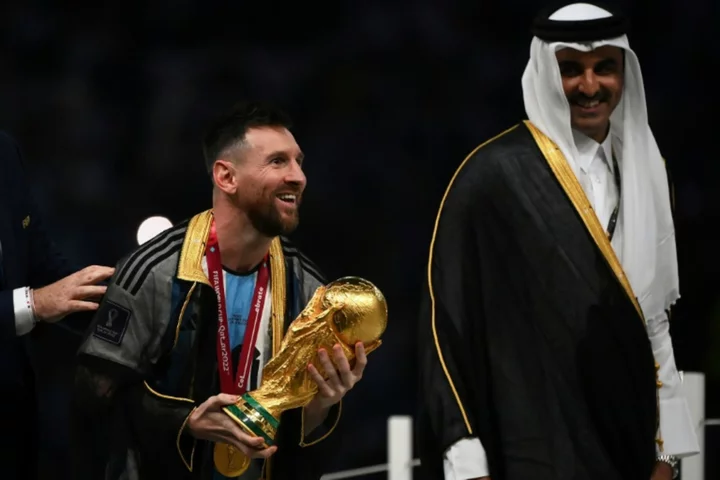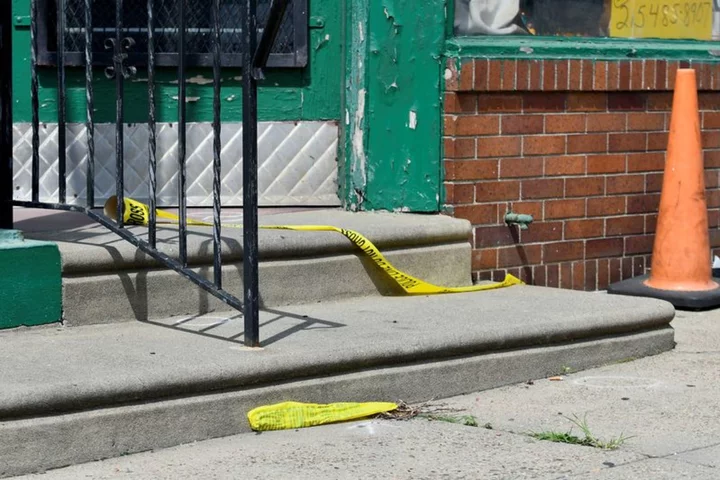One year after the Qatar World Cup, billboards emblazoned with the tournament's official slogan, "All is now," still stand by Doha's roadsides.
As the months have passed, the signs, in Qatar's trademark maroon, have steadily faded in the relentless glare of the desert sun.
Calm has returned to Doha, 12 months after the gas-rich emirate attracted hordes of fans -- and rancorous debate -- for the first World Cup in the Muslim world.
At the Corniche, the shore-hugging thoroughfare through central Doha, crowds, big screens showing the action on the pitch and loudspeakers have been replaced by orderly traffic and a somnolent atmosphere.
"It's very difficult to beat the World Cup. That is for sure," Jassim Al Jassim, head of operations for Qatar's organising committee, told AFP on Monday, one year to the day since the opening game.
"This time last year it was a very, very tense day," he said. "But I think overall, we were very happy and we were very proud of what we achieved as a country."
Qatar was hit by a storm of criticism over the World Cup, starting with the 2010 bidding process which was tainted by accusations of corruption -- denied by Qatari officials.
The rights of migrant workers, women's equality, laws against homosexuality and the availability of alcohol also became flashpoints for the wealthy emirate, which countered by accusing its critics of racism.
Some experts believe the confrontations improved Qatar's image among Arab nations and helped pave the way for neighbouring Saudi Arabia to emerge as host of the 2034 World Cup.
The "Gulf has moved to the centre of global sports", said Danyel Reiche, a Qatar-based expert on politics and sport.
The successful Saudi bid "might not have been possible if there had not been already a successful World Cup in 2022", he added.
- 'Absolutely worth it' -
Tiny Qatar was transformed for the tournament, with a new metro, airport expansion, upgraded roads and new hotels, plus eight world-class stadiums, at a cost of $220 billion.
It was billed as the most expensive World Cup in history but organisers reject that tag, saying much of the infrastructure expedited for the tournament was already budgeted.
"The $220 billion spent in the country for infrastructure is worth it, absolutely worth it, but it was not done solely for the World Cup," Jassim said.
Seven of the stadiums were constructed at a cost of $7 billion, Jassim said.
The venues, including the flagship Lusail Stadium, were slated to be downsized and the 40,000-capacity 974 Stadium, built from shipping containers, was supposed to be packed up and relocated.
These plans, a principal part of Qatar's World Cup offering, are on hold after Qatar stepped in to host the upcoming football Asian Cup when China, the original organisers, pulled out last year.
"The future right now for Lusail Stadium is the opening and closing ceremony of the Asian Cup," Jassim said, without elaborating on its future after the January-February tournament.
Jassim also declined to give details of the "dismantling" of 974 Stadium, which will not be used in the Asian Cup, although he said an announcement would be made "very soon".
- 'Attack on Qatar' -
Last week, rights group Amnesty International accused Qatar of "continued failure" on workers' rights and said it had fallen short in enforcing employment legislation changes.
In response, Qatar's International Media Office said the World Cup had "accelerated" the country's labour reforms and left a "lasting tournament legacy".
Jassim dismissed the criticism surrounding the World Cup as "just an attack on Qatar" by people who he said "felt we were not worthy of hosting such a tournament".
Hisham Hellyer, a Middle East expert, said what was viewed as aggressive targeting of Qatar had "boosted Doha's standing and image" in the region.
The University of Cambridge academic said it was framed "as a campaign against Qatar for being Arab and Muslim.
"When the criticism is framed in that way, then there is going to be rallying to Doha from Arab and Muslim populations worldwide."
Reiche, the Qatar-based specialist on politics and sport, said the row had burnished Qatar's reputation in the region, improving relations after Saudi Arabia led a blockade of the peninsula by its neighbours from 2017-2021.
"When we see the emir wearing a Saudi scarf after Saudi won against Argentina and everyone rallying behind the Moroccan team... I think the World Cup itself contributed to what I would call a revival of pan-Arabism," he added.
csp/th/pi/gj









